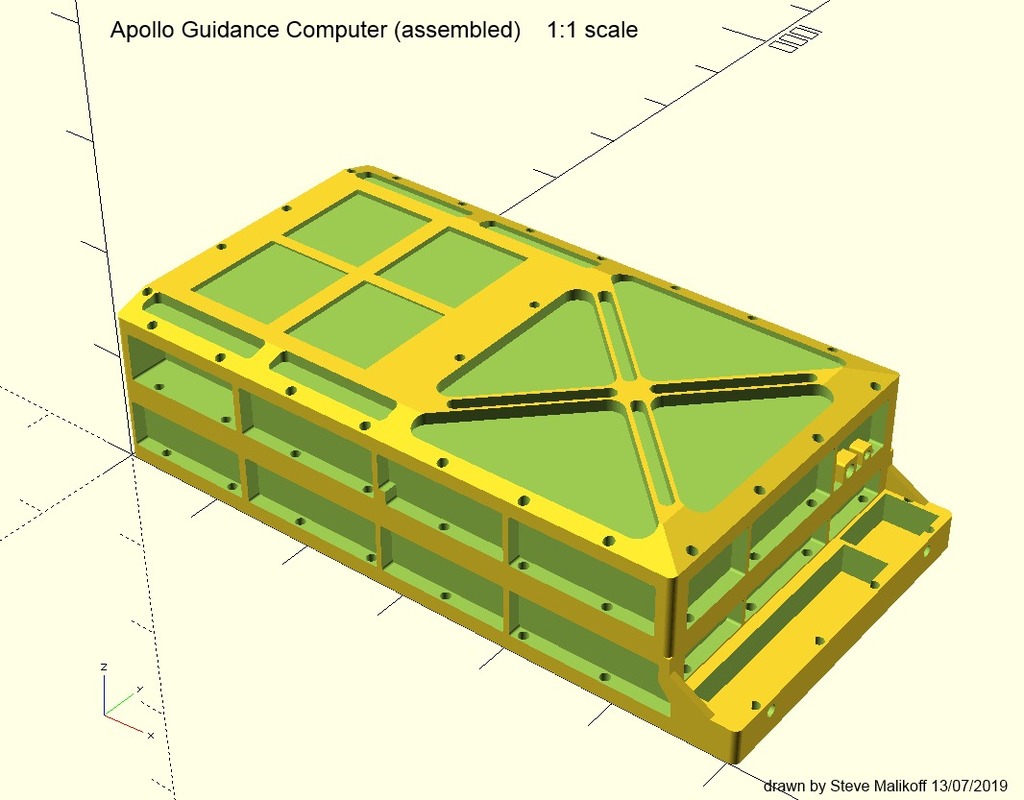
Apollo Guidance Computer (AGC) 1:1 scale model (WORK IN PROGRESS)
prusaprinters
<p>Coming up to the 50th anniversary of the first moon landing, I've been amazed by the efforts of Marc, Mike, Ken and Carl in getting an AGC operational, all made possible by Jimmie saving the AGC way back when. If you haven't seen it, search for the AGC restoration series by Curious Marc on YouTube and start at Part 1.</p> <p>Seeing as there are a few DSKY models around I thought I'd tackle the AGC computer chassis itself. Until recently, measurements for it have been a bit vague but now these have been made possible by Mike's PDF scan of Don Eyles' AGC manual from MIT: <a href="https://archive.org/details/agc_handbook_jp2">https://archive.org/details/agc_handbook_jp2</a></p> <p>This PDF has acceptably good drawings of the AGC trays, cover plates and the like, of what I resume to be an earlier(?) version of the casing. To get reasonably accurate extraction of dimensions from that document I've corrected a number of the drawings mostly by rotating the images, often by fractions of less than one degree prior to overdrawing in CAD to produce the 2D plan, elevation, front and back views. These are all then scaled individually to the correct size.</p> <p>Additional details have come from Marc's excellent videos on Youtube where I have taken frame grabs which I loaded into CAD then applied some basic photogrammetry.</p> <p>These and other photos are all I've used. I am aware Mike has some SVG's on his site of the chassis trays but I have not referenced them, preferring to stick to all my own work.</p> <h3>COMPONENTS</h3> <p>The model presented here is full size, the AGC being approximately 607.49mm long (deep) by 315.8mm wide by 151.36mm high (23.9" long x 12.43" x 5.96" high).</p> <p>The component functions of this model are (so far):</p> <p>Lower cover plate</p> <p>Lower tray A</p> <p>Middle plate</p> <p>Upper tray B</p> <p>Rope memory frame</p> <p>Top cover plate</p> <p>Logic module</p> <p>Power supply module</p> <p>These are displayed in an exploded format in one of the pictures.</p> <h3>SCALES</h3> <p>I'ts unlikely you'd want to print the model at full size, but at a smaller scale. To change the scale of the model, simply adjust the SCALE variable at the top of the script (for now). The default size, and of the STLs here is 1:1 scale.</p> <p>eg. some possible scales you might like to try</p> <p>SCALE = 1; // full size "one cubic foot". It could make an interesting PC case :)</p> <p>SCALE = 1/5; // Raspberry Pi Model 3B case size, but needs some holes punched through the trays for the RasPi plugs and sockets (TODO).</p> <p>SCALE = 1/6; // Suitable for 1/6 scale figures, eg. GI Joe</p> <p>SCALE = 1/12; // Major Matt Mason doll size, also keyring fob size.</p> <p>You could also adjust the scale in your slicer. See the note about smaller scales.</p> <h3>INCOMPLETIONS AND INCONSISTENCIES</h3> <p>As this is a work in progress I wanted to get the basic gist of the model up onto Thingiverse before the 20th of July. There are many things left to do, clean up, adjust and so on.</p> <p>I need to study the rope tray frame a bit more to determine its shape better. In the Moon Machines AGC episode they show it being flipped over and inserted into Tray B. And I'm not even sure about the middle plate, but that seems evident in the MIT footage. Also the restored AGC has differences to the one in the MIT handbook.</p> <p>One problem is at 1/6 scale, the walls of the frames are existentially thin and don't print well, neither does the bottom cover plate. The model may need to have a fudge factor added for the wall thickness at this scale. Also the screw holes are very close to the tray edges</p> <h3>TODO</h3> <p>Logic modules completion</p> <p>Rope memory modules</p> <p>Rope tray flanges, end connector orifices and jackscrew holes</p> <p>Square up cloverleaf and recesses on top cover</p> <p>Panel separation lines on top cover rope frame area</p> <p>Main connector and test connector</p> <p>Tray B intermediate bulkhead and intertray connector plugs</p> <p>Test connector cover</p> <p>Miscellaneous brackets and fittings</p> <p>Reduce the number of magic number measurements in the script</p> <p>Different bottom panel and Tray B front for restored AGC version</p> <p>Add missing fillets and rounded corners</p> <p>More screw holes</p> <p>Some way of fixing all the parts together using the screw holes or clips</p> <p>Fudge factor wall and plate thicknesses for small scales</p> <p>Raspberry Pi connector plug cutouts</p> <p>Raytheon nomenclature plate. I intend to do an affine transformation on a skewed frame grab from one of the AGC videos</p> <p>Add some photos of my model print</p> <h3>NOTE</h3> <p>This AGC model is not for commercial use. Rather, I'm hoping it will get to the point of being sufficiently detailed that it could perhaps be educational. If I can find a good scale drawing of the IMU 'basketball' then that could be a consideration for modelling in future.</p> <h3>Print Settings</h3> <p><strong>Printer:</strong></p> <p>ALDI Coocoon</p> <p><strong>Rafts:</strong></p> <p>No</p> <p><strong>Supports:</strong></p> <p>Yes</p> <p><strong>Resolution:</strong></p> <p>0.1</p> <p><strong>Infill:</strong></p> <p>20%</p> <p><strong>Filament:</strong> doesn't matter. PLA</p> <p>Grey or silver</p> <p><strong>Notes:</strong></p> <p>At small scales the support may not be neccessary.</p> <p>Grey filament is an appropriate colour, some of the modules can be black.</p> Category: Computer
With this file you will be able to print Apollo Guidance Computer (AGC) 1:1 scale model (WORK IN PROGRESS) with your 3D printer. Click on the button and save the file on your computer to work, edit or customize your design. You can also find more 3D designs for printers on Apollo Guidance Computer (AGC) 1:1 scale model (WORK IN PROGRESS).
